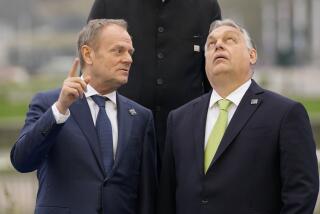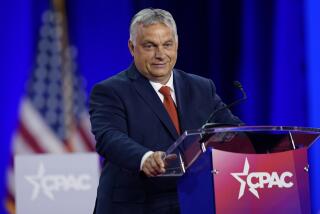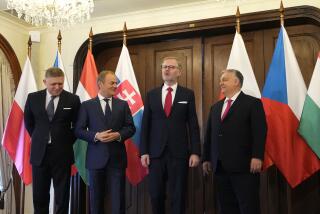Polish, Hungarian Economic Reforms Outlined for Nations Aiding East Bloc
- Share via
BRUSSELS — Poland and Hungary today outlined their economic reforms at a meeting with 24 Western nations that are coordinating aid to prevent Eastern Europe’s reforms from being derailed by economic troubles.
In separate presentations, Polish Foreign Minister Krzysztof Skubiszewski and Gyula Horn, his Hungarian counterpart, said their countries were creating market-oriented economies.
Also, they said, they will soon conclude talks with the International Monetary Fund for financial rescue packages that would free extra Western loans and help in easing their huge foreign debts.
In return, the IMF insists that both countries adopt sound economic policies.
“One of our most important aims is to shape a healthy . . . enterprise structure,” Horn told the foreign ministers of the donor nations, including the United States, the 12 European Community countries, Japan, Canada and Australia.
Skubiszewski detailed efforts to “demonopolize” the Polish economy “by opening wider the doors to free enterprise.”
Hungary and Poland have been at the forefront of the democratic changes reshaping Eastern Europe. Poland has the East Bloc’s first non-Communist premier, and Hungary has opened its borders, promised multiparty elections and formally disbanded the Communist Party.
Sources said both East European officials were questioned by several delegations about details of their economic reform programs and the measure of support they have in Warsaw and Budapest.
The meeting was the first between Secretary of State James A. Baker III and his 23 counterparts since President Bush and other world leaders suggested an aid program for Eastern Europe at a summit meeting in Paris in July.
Japanese Foreign Minister Taro Nakayama said today that the talks were “of great significance.”
“It is extremely important to remove . . . the economic hardships which confront Poland and Hungary and to enhance the smooth implementation of the economic reconstruction and development so that budding reform in the two countries will develop unimpaired and finally bear fruit.”
Nakayama said his government was prepared to offer $150 million to an economic stabilization fund for Poland as soon as the Warsaw government reaches an agreement with the IMF.
In Washington today, the White House announced that the United States will put up $200 million toward a $500-million temporary loan for Poland as it awaits economic help from the IMF.
More to Read
Sign up for Essential California
The most important California stories and recommendations in your inbox every morning.
You may occasionally receive promotional content from the Los Angeles Times.










